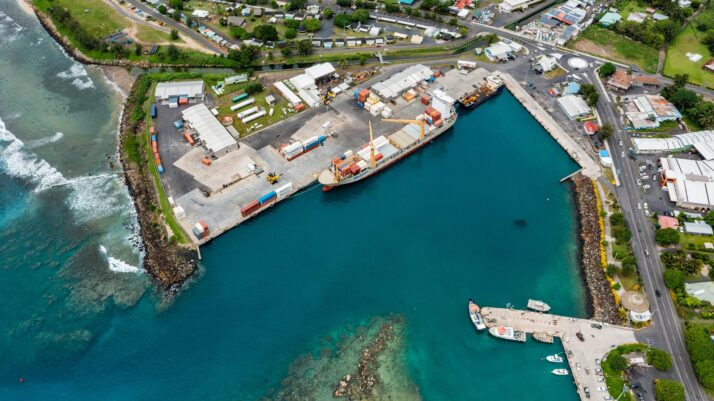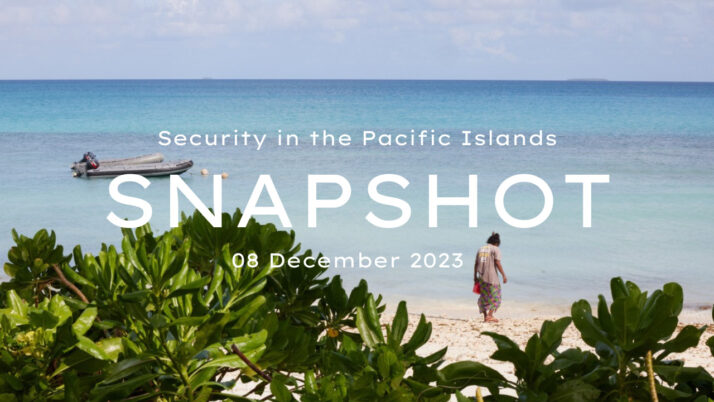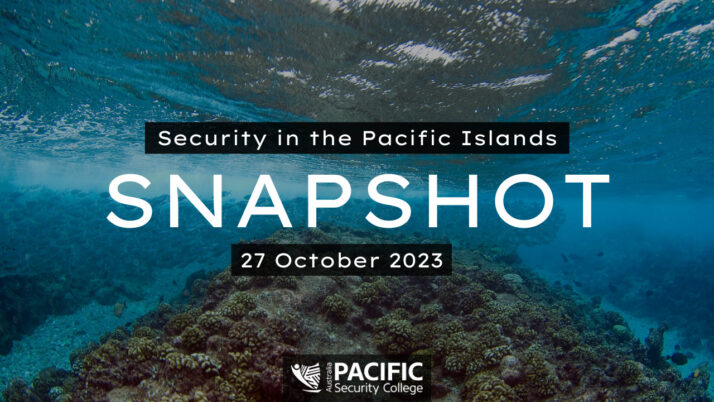Australia must play a key role in the Pacific’s push to decarbonise shipping

Avatiu Harbour, Raratonga. Image by Daniel Fisher
There is an opportunity for Australia to work with Pacific islands to invest in new technology and take a leadership role in the decarbonisation of shipping in the region.
Pacific leaders have stated their priority to transition to a fossil fuel free Pacific. Collectively they recently failed at getting the International Maritime Organisation (IMO) to agree on a carbon levy, but worked hard to give this idea greater exposure.
A recent paper from the Asia-Pacific Development, Diplomacy & Defence Dialogue (AP4D) highlights that shipping fleets in the Pacific are the oldest and worst carbon emitters in the world, underlining the urgent need to take action to address this problem.
Pacific island countries have the most expensive shipping in the world, the longest transport routes, and some of the oldest and least energy efficient ships.
Achieving economies of scale in the provision of maritime services in the Pacific is complicated by their small size, geographical dispersion, low trade volumes, ageing and inefficient domestic vessels and varying quality of port facilities. Servicing remote islands, while a political, social and economic imperative, is often not commercially viable.
Political and commercial pressures, ineffective compliance and enforcement, and a lack of supply and servicing capability for machinery and lifesaving equipment mean that Pacific island countries are trapped in a cycle of using old, inefficient and poorly maintained ships.
Both private and community sectors have little choice but to replace vessels with more of the same, purchasing degraded second-hand vessels. Some of the vessels have previously been involved in major accidents, posing significant safety concerns.
All of this is exacerbated by ageing port infrastructure, a lack of repair yards and servicing facilities and low maintenance of equipment and training facilities. Without considerable financial, human and technical resources, addressing these challenges remains out of reach for Pacific island countries.
There is a clear and urgent need to upgrade domestic vessels in the region to ensure access to safe maritime transport. This must go hand in hand with supporting the Pacific’s ambition to move towards a fossil fuel free Pacific.
It is essential to recognise that the Pacific’s decarbonisation pathway will not just be a case of scaling down international initiatives and projects to Pacific size. The region has a unique shipping scenario, and the challenges created by varying capacity, capability and resources across the region mean there is no one-size fits-all approach.
Decarbonisation could be achieved either through a dedicated new low/zero carbon fleet replacement program, including investigating the potential of Uncrewed Surface Vessels (USVs) powered by wind and solar, or retrofitting existing vessels to use alternative low carbon fuels.
The technology for this exists and is being used in other sectors such as Illegal, Unreported and Unregulated Fishing. Renewable energy use of propulsion (wind) and auxiliary powered supplementation (wind and solar) are already being used in the Pacific and could be replicated, advanced and scaled up.
USVs have potential to combat the prohibitive cost of transport between islands, with designs to accommodate shipping containers making them an efficient way to transport small trade volumes between islands, without risk to human life.
Adopting current technology would require significant investment. Climate financing could be harnessed from the IMO implementing a shipping carbon tax, creating a carbon fund to raise finance for developing nations.
Revenue flowing from climate financing and decarbonisation efforts can also provide funding to upgrade port facilities as well as ongoing vessel maintenance, training, technology and other safety provisions.
Australia can support further climate finance through supporting the Pacific Blue Shipping Partnership (PBSP), a coalition of Pacific governments calling for significant investment in next generation low carbon vessels.
The partnership, which includes the governments of Fiji, the Marshall Islands, Samoa, Vanuatu, the Solomon Islands and Tuvalu, is calling for an ambitious financing program of $500 million to retrofit all existing passenger and cargo ferries with low-carbon technology, making all shipping in the Pacific Ocean zero carbon by 2050.
Australia can also advocate for Pacific islands countries in international forums to support climate finance to be used for maritime safety in the Pacific.
The Australian government should be a strong partner for Pacific island countries on climate change, supporting adaptation measures that combat rising sea levels and more extreme weather events, improve port infrastructure and provide real time weather monitoring.
Australia’s support for decarbonisation of shipping will be a significant step towards positive climate action and build on the Pacific’s own ambitious goal for a fossil-fuel-free domestic shipping fleet.
Now is the time Australia must work closely with the Pacific and other partners to leverage climate finance and adopt modern technology to create a well-connected Pacific region with safe, reliable, inclusive, affordable and accessible sea transport.
Heather Wrathall is program lead and Kate Archer is editor at the Asia-Pacific Development, Diplomacy & Defence Dialogue (AP4D). This article draws on AP4D’s report on What does it look like for Australia to Partner on Maritime Safety with the Pacific.
More Stories

Security Snapshot - 11 Dec 2023
Pacific Security Snapshot | 08 December 2023
The security stories shaping the region Outcomes from 52nd Pacific Islands Forum Leaders’ Meeting in Cook Islands 12th General Assembly of the Pacific Conference of Churches Australia-Tuvalu Falepili Union signed Pacific climate change advocacy at COP28 EU-ACP Samoa Agreement signed Solomon Islands hosts 2023 Pacific Games First PNG woman for peacekeeping duties Regionalism The Fifty-Second…

Security Snapshot - 27 Oct 2023
Pacific Security Snapshot | 27 October 2023
The security stories shaping the region Fiji Prime Minister Rabuka promotes Pacific “Zone of Peace” Fiji-Australia Memorandum of Understanding on Cyber Security Cooperation Papua New Guinea and China hold bilateral talks United States and Marshall Islands renew COFA Vanuatu, Samoa and Fiji receive Japanese human security support Pacific Islands Forum releases Loss and Damage Policy…






